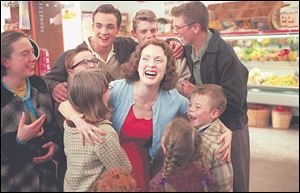
Movie review: The Prize Winner of Defiance, Ohio ***
10/21/2005
Evelyn Ryan (Julianne Moore) celebrates with her children.
Julianne Moore, more and more these days, adopts the frozen smile of a woman on the verge of a nervous breakdown.
If you always detected something desperate behind big, unremitting yellow smiley faces, she's something like a confirmation. To watch her is to watch a high-wire act. She's one of our best actresses, but she's so naked in her neediness, it's disconcerting. So compulsive in her ability to never appear truly content, Moore's performances start to look a lot like acts of self-flagellation.
She crooks her arm, rests her hand on her hip, tilts her head at right angles, and crosses her legs with a single smooth swoosh. Her voice is a piano trill. Her smile is plastered and, if you're less than exuberant, exasperating. But beneath the surface, or rather between the happy mask and what lies beneath - and this is her specialty- she suggests the anxiety of keeping up appearances. Sometimes it comes as an outburst. More often, when a piston in her misfires, that radiant smile dims.
And that's perhaps why, with The Prize Winner of Defiance, Ohio, she slides back into cardigans and repression like a second skin. Along with The Hours and Far From Heaven, Moore completes a trilogy about long-suffering housewives in the
'50s. She is Queen Formica, and Prize Winner is the sunniest of the trio, as it was meant to be, seeing how it's an adaptation of Terry Ryan's best-selling memoir of her mother, the Defiance housewife and all-around saint Evelyn Ryan (Moore), mother of 10 equally saintlike kids - 11, if you count her machinist husband, Kelly (Woody Harrelson), a recessive man who can, after a pint of whiskey, go from calling her "Mother" to being a mean drunk. And Evelyn puts up with things - that is what she does.
A friend of mine once told me she was convinced that Ethan Hawke and Julie Delpy, wandering Paris in the romantic Before Sunset, would meet with a violent end. It was all too serene for her. That seemed absurd to me. Now I get it: If I hadn't read Ryan's sweetly nostalgic book before seeing the movie, I might, likewise, have expected Evelyn to eventually rise up and show a little devil. At very least, swear.
One can only take so much.
But here was a remarkably placid woman. The conflict is not between her and her husband but between her and herself, struggling not to snap - not out of a personal code so much as because it's what the world demands and her children need. It's also what keeps us watching when first-time director Jane Anderson's film gets fussy and suffocatingly cheerful.
A Miss America contestant on television is asked if there should be a female president and replies no, "women are high-strung and emotional people." Evelyn smiles politely. A priest comes to the house to counsel Evelyn and Kelly, and ignoring Kelly's drinking, or that most of his pay goes to whiskey, the clergyman tells Evelyn, "No one says life is easy."
She smiles politely.
The film begins in 1956, and ends in the 1960s, and perhaps because it is adapted from a memoir by one of her children, it seems to rarely leave the dinner table. That's where she ruled. (The film, likewise, goes as far as the Indiana line, and turns back; the outside world never reaches Ohio.)
Evelyn cooks, cleans, changes diapers, picks up the plates her husband flings into the kitchen wall. But to keep the house fed (and mortgage paid), she writes jingles and poems and enters them in mail-in contests. In the nick of time, over and over, when the family needs a freezer or a son wants a bike, she lands the goods; and over and over again, Kelly, feeling emasculated at her effortless copy writing skills, throws a fit (along with a rib-eye or two).
Evelyn was a "contester" and the unofficial poet laureate of northwest Ohio homemakers. This newspaper you are reading even instituted an "Evelyn Ryan rule" to its weekly poetry contests (long-since discontinued): In the interest of fair play, after a while, she wasn't allowed to play. She won too often. When the movie begins, she's had her 10th child, but the look on her face after being told she won a washer and dryer and $5,000 is more rapturous and blubbery than you can imagine the birth of a mere child would receive.
Not to sound crass, but contesting was something she did on her own: She won cars, trips, appliances, supermarket sprees. Anderson gives some of this a snappy kick, and a dose of kitsch: Moore, at certain points, wanders into rooms addressing the audience, looking over her own shoulder; other times, a Greek chorus of jingle singers brings music to her well-chosen words. And prizes appear in the living room with a happy ping!
It's all so aggressively upbeat, the deficiencies begin to cry out: Evelyn, as she was in the book, is not much of a character - a real person, but dramatically, a reflection of her children's love.
So the Ryan household, with 10 kids, is an amazingly chaos-free place. I don't buy it - a less sentimental eye might have brought in some real heft.
The anger in The Prize Winner of Defiance, Ohio, after all, is there, but once-removed. It's never expressed by anyone but her daughter Terry, No. 6, who wonders why mom wasted her life. That she later wrote a book and found the answer is one about making lemons from lemonade will shock no one. The result is a tentative weepy that earns its tears but leaves us with a Buckeye saint, and a layer of plaster to chip off.
Contact Christopher Borrelli at: cborrelli@theblade.com
or 419-724-6117.